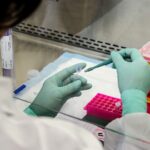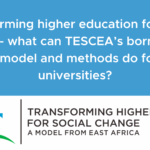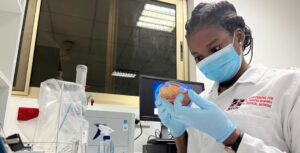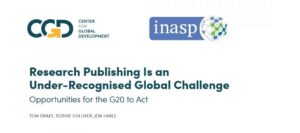
Using AI to reduce knowledge inequity – a transdisciplinary approach
How can digital tools and artificial intelligence (AI) break some barriers in scientific collaboration, communication, and the use of research evidence across the African region? Can they help to foster greater transdisciplinarity in research and evidence use? Could the development of new web applications help to do this? Dr Fidelia Dake, Dr Emmanuel Olamijuwon, Dr Stephen Fashoto and Jeremiah Olamijuwon, all part of the Social Research 2 Social Change team, talked to us about their ideas and approaches.
In September 2021, we introduced the three teams who would be embarking on a series of discovery projects, with INASP’s support, in response to the recent call for partners. One of those teams was the “Social Research 2 Social Change (SR2SC)” team, spanning Accra (Ghana), Johannesburg (South Africa), St Andrews (UK) and Kwaluseni (Eswatini). The team brings together social scientists – Dr Fidelia Dake and Dr Emmanuel Olamijuwon – and computer scientists – Dr Stephen Fashoto and Mr Jeremiah Olamijuwon – to address the under-visibility of African science and Southern research more broadly.
They told us about how the team connected and SR2SC’s goals for the future:
We (Fidelia and Emmanuel), connected through the Summer Institute for Computational Social Science (SCISS) held in Cape Town, South Africa, in 2019, where we were exposed to opportunities at the intersection of computer science and social science.
As social scientists, we both had limited experience coding and applying computational methods in the social sciences prior to SICSS. We were puzzled by the difficulty of finding African voices in computational social sciences. It was hard to identify who was researching what topics and where. We think this difficulty was partly complicated by the paucity of computational social science research from Africa and the dominance of such research from the Global North.
We believed that the challenges we experienced in our research might apply to other research domains and that AI may offer great potential to identify what African researchers are producing, what topics and questions they are researching, and where they are based. Research from Africa and from the Global South, in general, should not be as difficult to find as it currently is and we want the voices of African researchers in Computational Social Science to be seen and known. We joined forces with Stephen and Jeremiah, both computer scientists.
Stephen and Jeremiah have vast experience adapting AI to a wide range of issues, including transportation, banking, and health. They met at the Black in AI conference in Vancouver, Canada, in 2019. There, they discussed the application of AI in addressing some of the world’s toughest problems such as maternal health outcomes, climate change, and economic inclusion. Their meeting set the stage for future interdisciplinary collaborations with social scientists and health researchers to address these problems. Both are collaborators on a recent study examining the application of deep and machine learning techniques for multi-label classification performance on psychotic disorder diseases. They were also coordinators and guest speakers at Deep Learning IndabaX held in Eswatini in 2021.
In November last year, the team convened a two-day Social Research to Social Change (SR2SC) workshop which brought together 19 social scientists and computer scientists to think through how the barriers to the visibility of research from the Global South could be reduced using AI. Among other things, the workshop emphasised the need for more robust data from Africa and the need for voices from Africa to be audible in scholarly debates globally. This is primarily because context matters in addressing several of the current global challenges.
SR2SC featured guest presentations and virtual networking sessions that could foster opportunities for collaboration as well as interdisciplinary and transdisciplinary partnerships. There was also an Ideathon – a brainstorming activity where participants engaged in groups of four to define a clear strategy for breaking barriers in science communication and collaboration in Southern science using AI. During the ideathon, teams pinpointed some key challenges to the visibility of research from the Global South. Challenges identified include the realisation that researchers from Africa do not often have institutional support in propagating their findings, thus limiting the visibility of their work to the researcher’s deliberate efforts.
In addressing these challenges, the teams also identified and proposed three potential areas where AI could be used to reduce knowledge inequities:
- Academic journals can use automated advertising systems on major search engines and social media to propagate research from the global South. In addition, an automated research summary generator could make research findings from the Global South readily accessible across the world and also assist in distributing findings globally.
- AI recommendation systems could also be used to suggest relevant or similar research from Africa or the Global South while reading a research article. Such a recommendation system could be developed as a web-browser plugin, thus motivating researchers worldwide to know, read and cite more research from Africa that may have otherwise not been easily identified through a regular search.
- AI systems could also function as researchers’ intelligent methodological reviewer and quality control. As a result, an AI system could be used to review sections of the manuscript, such as the methodology for compliance and to ensure that all the relevant details have been adequately captured and the methods are robust enough and all statistics are appropriate. AI tools can also be employed in checking outliers before modelling as well as in modelling. Such efforts may boost confidence and motivate researchers to be more rigorous and transparent while ultimately increasing public confidence in their work and also enhance the visibility of Southern Science.
Following SR2SC, the team is now developing a web platform, Southern Science Explorer (SouthScieX), to help break the barriers in the visibility of research from the Global South. They hope that SouthScieX will make it easier to identify researchers working on specific topics across the priority areas of the Sustainable Development Goals in the Global South and to leverage AI to match African researchers with others in the Global South on similar research areas. The team will also lead the summer institute in computational social science [SICSS] at Covenant University in June 2022 to further develop some of the ideas.
Photo credit: Joshua Sortino, Unsplash

 Previous Post
Previous Post Next Post
Next Post


